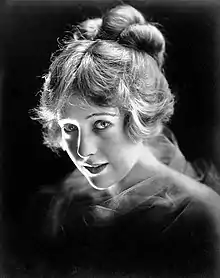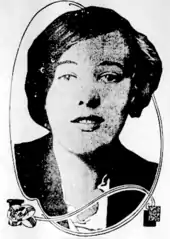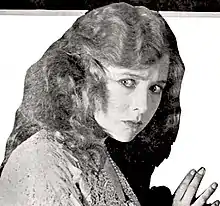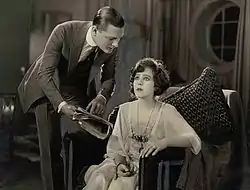Jewel Carmen
Jewel Carmen (born Florence Lavina Quick; July 13, 1897 – March 4, 1984) was an American silent film actress who appeared in over thirty films, mostly in the late 1910s. In addition to being known for her film career, she received notoriety for being involved in several scandals throughout her career.
Jewel Carmen | |
|---|---|
 Carmen, ca. 1916 | |
| Born | Florence Lavina Quick July 13, 1897 |
| Died | March 4, 1984 (aged 86) El Cajon, California, U.S. |
| Other names |
|
| Education | St. Mary's Academy |
| Occupation | Actress |
| Years active | 1912–1926 |
| Spouse(s) | |
Raised in Portland, Oregon, Carmen began acting in Hollywood at age 15, eventually performing with Keystone Studios. She first garnered public attention for her involvement in a statutory rape case involving herself and a 35-year-old automobile dealer in Los Angeles, but the charges against him were ultimately dropped as she could not concretely prove her age.
Carmen resumed her career, appearing in several films throughout the 1910s, including a small role in D. W. Griffith's Intolerance (1916), followed by leads in American Aristocracy (1916) opposite Douglas Fairbanks, and in Frank Lloyd's A Tale of Two Cities (1917). She also starred as Cosette in Lloyd's adaptation of Les Misérables (also 1917). In 1918, she married film director Roland West. Carmen made her final film appearance in West's horror film The Bat (1926).
In December 1935, Carmen garnered significant media coverage following the death of actress Thelma Todd, who died of carbon monoxide poisoning in the garage of Carmen and West's Pacific Palisades home. Carmen became embroiled in the investigation after she claimed to have seen Todd on Hollywood Boulevard hours after the time police determined Todd had died. A grand jury ultimately ruled Todd's death accidental, with the consensus that she had inadvertently caused her own death by running her car inside the garage to warm herself after West locked her out of the home; Todd and West had been engaged in a romantic affair at the time.[3] Following Todd's death, Carmen and West divorced, and she lived the remainder of her life outside the public eye before dying in an El Cajon nursing home in 1984, aged 86.
Life and career
1897–1912: Early life
Carmen was born Florence Lavina Quick on July 13, 1897[4] in Portland, Oregon,[lower-alpha 1] to Amos William and Minerva Quick.[7] Her father was a native of Kentucky, while her mother was born in Arkansas.[6] Amos worked as a farmer and carpenter to support the family.[7] She had two older sisters, Alice and Edna; one older brother, Fred; one younger sister, Alberta;[6] and a younger brother, Henry.[7] She also had two other sisters, Louella and Florence, both of whom died during her childhood.[7]
Quick spent her early years near Tillamook living on a farm before the family returned to Portland in 1900, where she attended Mount Tabor School[7] and St. Mary's Academy.[8] In 1911, Amos left his wife and children to seek work in Los Angeles.[7]
1912–1916: Career beginnings and scandal
In February 1912, Quick relocated with her mother to Los Angeles, following her father; she aspired to be an actress.[7] Within two weeks, she found work as a film extra for the DeMille Company.[7] Shortly after, her siblings, who had temporarily remained in Portland, also moved to Los Angeles.[7] Quick made her film debut in the 1912 film The Will of Destiny, credited as Florence La Vinci, and subsequently appeared in several films for Keystone Studios, including The Ragtime Band, using the name Evelyn Quick; because the studio mandated performers be 16 years old or older, she lied about her age, claiming to be 17.[7] Throughout early 1913, Carmen appeared in minor roles in numerous films for Mack Sennett under this name.[9]

In April 1913, Quick was involved in one of the first major scandals in Hollywood:[7] A grand jury had indicted 35-year-old William La Casse, a wealthy automobile dealer, on charges of statutory rape.[7] La Casse had initially been investigated over a potential connection to a white slavery ring, but his relationship with a then-15-year-old Quick was subsequently uncovered.[7] However, La Casse denied that the two had been intimate.[7] Quick testified against him in court, also implicating William Hollingsworth, a friend of La Casse, in having intimate relations with her.[10] Quick's elder sister, Alice, also testified that she had witnessed Quick and La Casse together on several occasions.[11] One article covering the case claimed that, during a preliminary examination, it was stated that Quick had purportedly been an orphan, and was adopted by her parents, Amos and Minerva.[10] Because Quick did not possess a birth certificate proving herself a minor, the grand jury attempted to use other means—including sworn testimony from Minerva, as well as the recorded names and birthdates in the Quicks' family Bible—as evidence.[12] However, with the jury lacking sufficient evidence proving Quick's age, and after the failure of two witnesses to appear in court (one of them being Quick),[13] the charges against La Casse were ultimately dropped.[14]
Following the scandal, Quick resumed her career in films using the name Jewel Carmen, and went on to appear in Daphne and the Pirate (1916) opposite Lillian Gish, and in D. W. Griffith's Intolerance (1916).[15]
1917–1921: Lawsuits against Fox

In 1917, Carmen contracted with Fox Film Corporation, but finding the deal unsatisfactory, she opened a new contract with the Keeney Corporation in 1918 while her first contract remained in effect.[16][17] Fox sent Keeney notice of their prior contract, warning that they would hold Keeney responsible for assisting her in breaking it,[16] and promising to indemnify Keeney against legal retaliation.[18] Carmen launched two lawsuits against Fox, one to attempt to free herself of the obligation of fulfilling her contract, and another to seek redress for their interference with her contract with Keeney.[18]
Key to the issues was the question of where the contracts had been made: New York or California. Fox's offices were located in New York; Carmen was a resident of California. By California law, Carmen was an adult when the contract was signed; by New York law, which granted majority at 21, she was not. If not an adult, she could not be legally held to the document she had signed.[19] Though Carmen initially won the first lawsuit, having the contracts set aside and receiving damages of $43,500 from Fox, the decision was overturned on appeal because she had "unclean" hands, having herself treated Fox unfairly.[18][20][21][22] She won her second case because Fox's interference with her employment with Keeney had been outside the law, though Justice Benjamin N. Cardozo made clear that he did not approve of the legal loophole that allowed Carmen to break her contract with Fox.[18][23]
In the midst of the ongoing lawsuits, Carmen married film director Roland West. West subsequently cast her as the lead of his 1921 film The Silver Lining, in which she portrayed one of two orphaned sisters who is adopted by a thief.[24] She followed this with the drama Nobody, also released in 1921.[15]
1922–1984: Subsequent scandal and retirement
Following her marriage, Carmen went into semi-retirement, and did not appear in films for five years. She made her final appearance in the horror film The Bat (1926), directed by her husband, West.[15]
Death of Thelma Todd
Carmen later became known for her connection to the scandal surrounding the December 16, 1935 death of actress Thelma Todd.[25] Todd was found deceased from carbon monoxide poisoning in her car, which was parked and running inside the garage of Castillo del Mar, a residence owned by Carmen and West in Pacific Palisades.[3] Castillo del Mar was located only one block away from the Thelma Todd Cafe,[3] a restaurant for which Todd served as the face, and which was financially backed by West and owned by Carmen.[25] At the time of Todd's death, Carmen's parents were residing at Castillo del Mar.[26]
There were a number of factors which made the death suspicious, including that Todd was allegedly spotted or spoken to several times the day after she died; Carmen herself testified before the grand jury that she had seen Todd riding in a phaeton on Hollywood Boulevard around 11:00 p.m. on December 15,[27] hours after police estimated Todd had already died.[25][28] Claims from staff that Todd had been beaten by an unnamed man at the cafe in the days before her death were also investigated by law enforcement.[25]
West was subject to allegations that he had deliberately shut the garage door while an intoxicated Todd was sleeping in her car.[29] However, Todd's death was ultimately ruled accidental, inadvertently caused by her own actions.[3] Biographer Hans J. Wollstein notes that the rumors surrounding Todd's death involving Carmen and West mostly had "no foundation whatsoever."[30] Following Todd's death, the marriage between Carmen and West ended, and she retired from the public eye.[29]
Death
Carmen died of lymphoma at Helix View Nursing Home in El Cajon, California on March 4, 1984, aged 86.[4]
Filmography

| Year | Film | Role | Notes | Ref. |
|---|---|---|---|---|
| 1912 | The Will of Destiny | Frances | Credited as Florence La Vinci | [31] |
| 1913 | Those Good Old Days | Lady in Court | Credited as Evelyn Quick | [32] |
| 1913 | The Professor's Daughter | Credited as Evelyn Quick | [33] | |
| 1913 | A Strong Revenge | Party Guest | Credited as Evelyn Quick | [34] |
| 1913 | The Two Widows | Widow | Credited as Evelyn Quick | [34] |
| 1913 | Wife Wanted | Girl | Credited as Evelyn Quick | [32] |
| 1913 | Cupid in a Dental Parlor | Ethel Parks | Credited as Evelyn Quick | [35] |
| 1913 | The New Conductor | Woman on Streetcar | Credited as Evelyn Quick | [35] |
| 1913 | That Ragtime Band | Girl in Audience | Credited as Evelyn Quick | [35] |
| 1913 | The Gangsters | Girl | Credited as Evelyn Quick | [35] |
| 1913 | Professional Jealousy | Credited as Evelyn Quick | [33] | |
| 1913 | He and Himself | Credited as Evelyn Quick | [33] | |
| 1913 | Four Queens and a Jack | The Girl | Credited as Evelyn Quick | [33] |
| 1913 | Their Husbands | Credited as Evelyn Quick | [33] | |
| 1916 | Daphne and the Pirate | Credited as Jewell Carman | [29] | |
| 1916 | Sunshine Dad | Charlotte | [15] | |
| 1916 | The Children in the House | Jane Courtenay | [15] | |
| 1916 | Flirting with Fate | Gladys, the Girl | Alternative title: The Assassin | [15] |
| 1916 | The Half-Breed | Nellie | Alternative title: The Carquinez Woods | [15] |
| 1916 | Intolerance | Favorite of the Harem | Uncredited | [7] |
| 1916 | Manhattan Madness | The Girl | [15] | |
| 1916 | American Aristocracy | Geraldine Hicks | [15] | |
| 1917 | The Kingdom of Love | Violet Carson | [15] | |
| 1917 | A Tale of Two Cities | Lucie Manette | [15] | |
| 1917 | American Methods | Claire de Beaulieu | [15] | |
| 1917 | To Honor and Obey | Rose Delvane | [15] | |
| 1917 | The Conqueror | Eliza Allen | [15] | |
| 1917 | When a Man Sees Red | Captain Sutton | [15] | |
| 1917 | Les Misérables | Cosette at age 18 | [15] | |
| 1918 | The Girl with the Champagne Eyes | Nellie Proctor | [15] | |
| 1918 | The Bride of Fear | Ann Carter | [15] | |
| 1918 | Confession | Mary Anderson | [15] | |
| 1918 | Fallen Angel | Jill Cummings | Alternative title: Paying the Piper | [15] |
| 1918 | Lawless Love | LaBelle Geraldine | Alternative title: Above the Law | [15] |
| 1921 | The Silver Lining | The Angel | [15] | |
| 1921 | Nobody | Little Mrs. Smith | [15] | |
| 1926 | The Bat | Miss Dale Ogden | [15] | |
Notes
- Some contemporaneous sources erroneously report that Carmen was born in Danville, Kentucky,[5] and this has contemporarily been re-published on websites such as the Internet Movie Database and AllMovie. According to census records, Carmen's father was originally from Kentucky,[6] while her mother was raised in Danville, Arkansas,[7] which may potentially account for this confusion. The United States Census of 1910 lists the birthplace of Florence Lavina Quick as Oregon,[6] while a 1921 newspaper profile on her states that she was born in Portland.[1] Biographer William Donati also corroborates her birthplace as Oregon, not Kentucky.[7]
References
- Perrill, Polly (January 9, 1921). "I'll Tell You". Wichita Daily Eagle. Wichita, Kansas. p. 31 – via Newspapers.com.
- "Jewel Carmen, American actress". Getty Images. Archived from the original on August 26, 2019. Retrieved August 26, 2019.
Also credited as Evelyn Quick and Florence La Vinci, her colourful life also included her alleged involvement in a blackmail and white slavery ring, contract disputes and litigation with several film companies and the scandal surrounding the mysterious death of actress Thelma Todd...
- Donati 2014, p. 174.
- Vazzana 2001, p. 80.
- "Daintier Than Dresden China". The Tampa Times. Tampa, Florida. September 29, 1917. p. 14 – via Newspapers.com.
- "Thirteenth Census of the United States", United States Census, 1910; Portland, Multnomah County, Oregon; roll 1287, page 3B,, enumeration district 321, Family History film 1,375,300.
- Donati 2014, p. 48.
- "Oregon Folk Are Screen Stars; Portland Training Is Valuable". The Oregon Daily Journal. Portland, Oregon. June 6, 1920 – via Newspapers.com.
- Walker 2013, pp. 274–276.
- "Orphan's Confession Causes Big Investigation". The Shreveport Times. Shreveport, Louisiana. May 18, 1913. p. 2 – via Newspapers.com.
- Donati 2014, p. 49.
- "Soft Pedal on Her Testimony". Los Angeles Times. Los Angeles, California. May 6, 1913. p. 19 – via Newspapers.com.
- Walker 2013, p. 34.
- Donati 2014, pp. 48–49.
- "Jewel Carmen Filmography". AFI Catalog of Feature Films. Los Angeles, California: American Film Institute. Archived from the original on January 7, 2019.
- Rich & Wailes 1921, p. 1211.
- Kaufman 1998, p. 228.
- Kaufman 1998, p. 229.
- Rich & Wailes 1921, p. 1212.
- Rich & Wailes 1921, pp. 1210–1213.
- Carmen v. Fox Film Corp. 269 F. 928 (2nd Cir., 1920); cert denied, 255 U.S. 569, 41 S.Ct. 323 (1921)
- Field, Kaplan & Clermont 2007, pp. 1077–1079.
- Rich & Wailes 1921, p. 1210.
- Langman & Finn 1994, p. 248.
- "Todd Probers to Quiz 'Woman in Case' Today". Wisconsin State Journal. Madison, Wisconsin. United Press. December 27, 1935. p. 1 – via Newspapers.com.
- Donati 2000, p. 39.
- "Thelma Todd's Phone Call Dec. 15 Related". The San Francisco Examiner. December 24, 1935. p. 2 – via Newspapers.com.
- Nash 2004, p. 250.
- Wright 2002, p. 3.
- Wollstein, Hans J. "Jean Carmen". AllMovie. Archived from the original on January 7, 2019.
- "Answers to Inquiries". Motion Picture Magazine. Vol. 4. Macfadden-Bartell. 1912. p. 158.
- Walker 2013, p. 274.
- Lowe 2014, p. 103.
- Walker 2013, p. 273.
- Walker 2013, p. 276.
Sources
- Donati, William (2000). Ida Lupino: A Biography. Lexington, Kentucky: University Press of Kentucky. ISBN 0-8131-0982-5.
- Donati, William (2014). The Life and Death of Thelma Todd. Jefferson, North Carolina: McFarland. ISBN 978-0-786-48817-9.
- Field, Richard H.; Kaplan, Benjamin; Clermont, Kevin M. (2007). Civil Procedure- Materials for a Basic Course. New York: Foundation Press. ISBN 978-1-59941-145-3.
- Kaufman, Andrew L. (1998). Cardozo. Cambridge, Massachusetts: Harvard University Press. ISBN 0-674-09645-2.
- Langman, Larry; Finn, Daniel (1994). A Guide to American Silent Crime Films. Westport, Connecticut: Greenwood Press. ISBN 978-0-313-28858-6.
- Lefler, Timothy Dean (2016). Mabel Normand: The Life and Career of a Hollywood Madcap. Jefferson, North Carolina: McFarland. ISBN 978-1-476-62307-8.
- Lowe, Denise (2014). An Encyclopedic Dictionary of Women in Early American Films: 1895-1930. New York: Routledge. ISBN 978-1-317-71896-3.
- Nash, Jay Robert (2004). Great Pictorial History of World Crime. Lanham, Maryland: Rowman & Littlefield. ISBN 1-928831-22-2.
- Rich, Burdett A.; Wailes, M. Blair, eds. (1921). American Law Reports Annotated. 15. Rochester, New York: Lawyers Co-operative Publishing Company.
- Vazzana, Eugene Michael (2001). Silent Film Necrology (2nd ed.). Jefferson, North Carolina: McFarland. ISBN 978-0-786-41059-0.
- Walker, Brent E. (2013). Mack Sennett's Fun Factory: A History and Filmography of His Studio and His Keystone and Mack Sennett Comedies, with Biographies of Players and Personnel. Jefferson, North Carolina: McFarland. ISBN 978-0-786-47711-1.
- Wright, David (2002). Joyita: Solving the Mystery. Auckland, New Zealand: Auckland University Press. ISBN 1-86940-270-7.
External links
| Wikimedia Commons has media related to Jewel Carmen. |